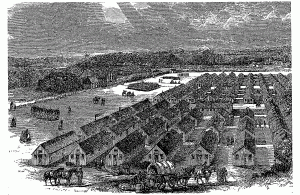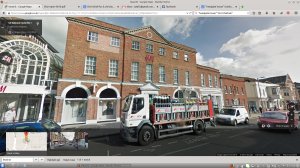I’ve known for a good while that the 2nd Earl of Chatham had close connections with Colchester. He spent a great deal of time there, connected with the military garrison. I believe he was, for a long while, Commander in Chief of the Eastern District, with headquarters in the town.

Colchester Barracks in the mid 19th century, from http://www.british-history.ac.uk/vch/essex/vol9/pp251-255
He was, however, in Colchester as early as 1798. John had not left the army since rejoining it in 1778, but between 1788 and 1798 he put politics first. In the summer of 1798, however, he received the rank of Major-General and clearly made a choice to return to his military career, appearing at the King’s birthday levee in his regimentals and moving to the Colchester garrison.[1] On 13 September 1798 Pitt the Younger wrote to his sister-in-law, Mary, Countess of Chatham: “I rejoice that my Brothers Military Life agrees so well with him, and that you like your Quarters, which I shall be very glad if I can visit … I shall direct this to Colchester.”[2]
From 1806 onwards John spent a significant part of the second half of each year in Colchester. Sometimes he seems to have been running away from something else — I suspect he spent so much time in Colchester in 1807 and 1808 because of his wife Mary’s illness, and after 1810 I would guess he had little to keep him in London — and how much his attraction to Colchester had to do with the local hunting scene, I could not say. He was a visible enough public figure, however, and in October 1807 the town Assembly appointed him High Steward of Colchester and gave him the Freedom of the Borough as “a new proof of the popularity of the [Duke of Portland’s] present vigorous Administration”, of which John was a member as Master General of the Ordnance.[3]
The post of High Steward was largely ceremonial (salaried, of course, although its £10 a year was hardly going to make much of a difference to John’s considerable debts). The post had been established in 1635, with a fairly vague brief “to advise and direct” the mayor, the twelve aldermen, twelve assistants, and eighteen councilmen who made up the Assembly, “to elect officers, make bye-laws, &c”.[4]
I imagine John much enjoyed the ceremonial aspects of the post, although these sometimes entailed more prosaic elements. Goodness knows how often he did this, and presumably this reflected John’s personal religious preferences (of which I have found no other sign so far), but I have tracked John down at a meeting of the Colchester and East Essex Auxiliary Bible Society in Colchester on 7 December 1812. I can only imagine John struggling not to fall asleep while the Reverend W. Dealtry thus concluded a long speech with reflections on the “noble patronage” Chatham brought to the meeting: “It is a patronage, of which, I am well persuaded, your Lordship never can repent; and I will venture to add, that by giving lustre to this society your Lordship will reflect lustre even upon your own illustrious coronet.”[5]
John was High Steward until 1818, when he was succeeded by John Round, a local barrister and MP. By this time Chatham had moved on: he settled at Abington Hall in Cambridgeshire in 1816, and his wife’s ill-health would in any case have kept him away from Colchester. But until 1815 he was frequently in the town, as is clear from all the correspondence dated from Colchester, as well as newspaper snippets following his movements.
But where did John stay in Colchester? It was quite obvious to me he must have had a reasonably permanent residence. For months I have been searching for it. Yesterday, quite by chance, I stumbled across a reference in a local Colchester journal in 1872, reminiscing about when “Lord Chatham lived in Head-Street”.[6] Further investigation revealed the name of his house in Head Street: Headgate House.[7]
Headgate House is now part of a shopping centre (H&M has moved in), but the frontage remains essentially unchanged from the house John Chatham would have known. It was described in an article as “possibly the finest family house in the town”, and the photographs reproduced in the article certainly suggest a house which, while rather less grand than what Chatham would have been used to, was grand enough. (The article is reproduced online here.)
Presumably this was the house where the following (somewhat dubious) anecdote was set:
It was the custom of Lord Chatham, when he commanded at Colchester, to invite every officer belonging to the garrison, in rotation, to his hospitable and elegant table. It happened, one day, that a raw Scotch lad, from some fastness of the Highlands, who had joined his regiment but a day or two previous, was placed opposite Lady Chatham, about midway between the noble host and his aid-de-camp, who sat at the bottom of the table. … A batter pudding was placed before her ladyship, when the sweets were paraded, and, with her usual urbanity, she invited Mr MacNab to partake … MacNab loved batter pudding, and he thought it a fitting occasion, in asking for more, to pay such a compliment to the elegant woman opposite to him as would make ample amends for his silence during the repast; without waiting, therefore, for a servant’s assistance, he pushed the plate across the table in a manner to attract her ladyship’s eye, and, with a countenance lit up by the brilliancy of the compliment he was about to pay, said, ‘Your pudden is sae excellent, my leddy, I needna ask ye wha made it.'[8]
I am still on the lookout for anything to do with Lord Chatham and Colchester: he spent so long there, and seems to have been so closely connected to the town, that I can’t believe he left absolutely no evidence of his being there. If anyone knows of anything, I would be grateful if you would contact me and let me know!
______________
References
[1] Express and Evening Chronicle, 2 June 1798
[2] William Pitt to Mary, Countess of Chatham, 13 September 1798, National Archives Chatham MSS PRO 30/8/101 f 141
[3] Bury and Norwich Post, 7 October 1807; Morning Post, 9 October 1807
[4] The History and Antiquities of the Borough of Colchester, in the County of Essex (Colchester, 1810), p. 74; A History of the County of Essex IX, Victoria County History (London, 1994) 156
[5] The Proceedings of the Colchester and East Essex Auxiliary Bible Society … (Colchester, 1812), unpaginated
[6] The British Flag and Christian Sentinel, 1 February 1872
[7] Philip Crummy, “The House that Ann and Hugh built”, Catalogue: New of Archaeological Excavations in Colchester, 18 (Winter 1985/6), 6-11
[8] Benson Earle Hill, Recollections of an Artillery Officer … I (London, 1836), 276-7


